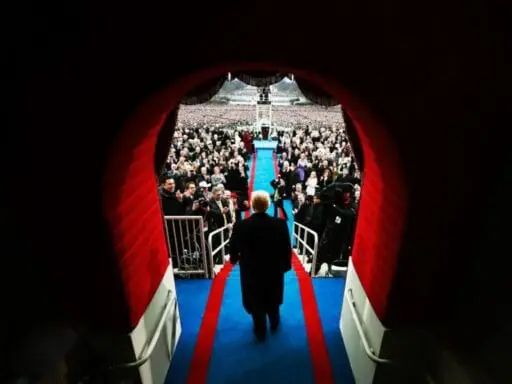
Russia-tied donations and oligarch connections have drawn Mueller’s interest.
What happened at Donald Trump’s inauguration 18 months ago, and why does special counsel Robert Mueller appear to be so interested in it?
Last week, ABC News’s Matthew Mosk and John Santucci reported that several wealthy Russians were “granted unusual access” to Trump inauguration parties back in January 2017 — and that Mueller was seeking to find out why.
This isn’t the first time we’ve heard of Mueller’s interest in the inauguration. Back in April, CNN reported that the special counsel was investigating “whether wealthy Russians illegally funneled cash donations directly or indirectly into Donald Trump’s presidential campaign and inauguration” — and had even questioned some oligarchs directly.
These reports have broken in the months since former Trump aide Rick Gates agreed to a plea deal with Mueller’s team in exchange for his cooperation. That may not be a coincidence — Gates was heavily involved in planning the inauguration, with a Yahoo News report in 2016 calling him the “shadow chair” of the event.
Yet beyond just Russia, there have long been serious questions about the money behind Trump’s inauguration — and where, exactly, it went. Trump’s inaugural committee raised a truly astonishing $106.7 million, double the previous record set by Barack Obama’s 2008 inaugural. But what they did with it isn’t so clear.
In a report for ProPublica and WNYC by Ilya Marritz earlier this year, the chair of George W. Bush’s second inauguration, Greg Jenkins, said he was baffled. “They had a third of the staff and a quarter of the events and they raise at least twice as much as we did,” he said. “So there’s the obvious question: Where did it go? I don’t know.”
Much like a typical Trump Organization project, then, his inauguration combined eye-popping sums of money and opulence with questions of financial mismanagement, corruption, and shady foreign influence. Here’s a guide to the many scandals surrounding it.
Tom Barrack planned Trump’s inauguration — with Rick Gates’s help
After Donald Trump unexpectedly won the 2016 presidential election, he was tasked with setting up an inauguration that would be worthy of his name and opulent reputation. The swearing-in event itself and the surrounding security and logistics are paid for the federal government. But for all of the big parties and events before and after the swearing-in — the concert on the National Mall beforehand, dinners and events for elite supporters, and the balls on inauguration night — Trump would have to find the cash for those himself.
So he’d need money — a lot of money. It’s not unusual for presidents to raise money for this purpose. Most recently, Barack Obama raised about $53 million for his first inauguration, and $43 million for his second. Trump decided to follow suit. Rather than fund the inauguration himself, the wealthiest president-elect ever decided to follow his predecessors’ lead and raise the cash from billionaires, wealthy financiers, and corporations.
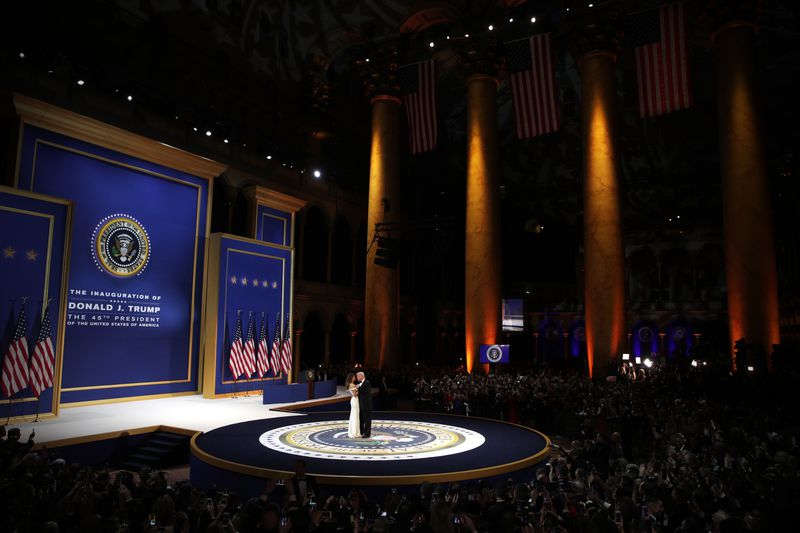 Alex Wong/Getty Images
Alex Wong/Getty ImagesSo a week after the election, Trump named a murderer’s row of uber-rich Republicans as “finance vice chairs” for the event. They included casino billionaires Sheldon Adelson and Steve Wynn (the latter of whom was later accused of sexually abusing employees), defense contractor Elliott Broidy (later involved in hush money payments to a Playboy model), and Anthony Scaramucci (later White House communications director for 10 days before resigning over an obscene interview with the New Yorker).
The man in charge of it all, as chair of the inaugural committee, was Tom Barrack. A billionaire real estate investor who’s been a close friend of Trump for decades, Barrack’s business interests have recently been concentrated in Saudi Arabia, the United Arab Emirates, and Qatar. (The Washington Post’s Michael Kranish and the New York Times’s David Kirkpatrick have both written excellent profiles of him.) His goal, he said, was for the inauguration to have “soft sensuality” and a “poetic cadence.”
To help with the planning and fundraising, Barrack turned to a Trump campaign aide: Rick Gates, the longtime right-hand man to Paul Manafort. (Barrack had known Manafort since the 1970s and helped convince Trump to bring him on to the campaign.)
Even at the time, the choice raised eyebrows, since Manafort had been ousted from the campaign after scandal-laden stories about his work for pro-Russian politicians in Ukraine. But, according to a November 2016 report by Michael Isikoff of Yahoo News, Gates became instrumental in fundraising and planning. Isikoff quoted a source calling Gates the “shadow” chair of the inauguration and Barrack’s “chief deputy.”
Trump’s inauguration raised an incredible amount of money
In the end, the inauguration crowd wasn’t exactly the largest in history — but the inaugural fundraising certainly was. Barrack, Gates, and the team raked in over $106 million, an astonishing sum that doubled the previous record (set by Obama in 2009).
The more you gave, the more exclusive events to which you got access. Among other perks, it took $1,000,000 to get you into the “Leadership Luncheon” at Trump’s hotel, $500,000 for a dinner with Vice President-elect Mike Pence, and $250,000 for a candlelight dinner at Union Station with the Trumps and Pences, according to a document obtained by the Center for Public Integrity’s Carrie Levine.
You can read through the full donor list at OpenSecrets.org, but among those willing to fork over such sums were:
- Finance industry bigshots: Robert Mercer (who the New Yorker later dubbed “the reclusive hedge-fund tycoon behind the Trump presidency”), Paul Singer (another hedge fund billionaire who, oddly enough, had paid the opposition research firm Fusion GPS to dig up dirt on Trump during the primaries), and Steve Cohen (whose hedge fund group was closed down due to insider trading allegations) all donated $1 million each.
- Corporate America: The inaugural committee raised $2 million from AT&T; $1 million each from Bank of America, Boeing, Dow Chemical, Pfizer, and Qualcomm; at least $500,000 each from JP Morgan Chase, FedEx, Chevron, Exxon, Fidelity, Intel, Citgo, and BP America.
- Secretive conservative groups: The American Action Network, a dark money nonprofit that’s spent tens of millions on elections since 2010, gave $1 million. Another million came in from a mysterious shell company called “BH Group, LLC,” and its true source remained mysterious for over a year. Only recently did journalist Robert Maguire trace that contribution to a group tied to the conservative legal movement and Federalist Society executive Leonard Leo, who’s found a prominent role advising Trump on judicial nominations.
And then there were those donors with major ties to Russia and other foreign countries, who have reportedly caught Mueller’s interest.
Mueller has been investigating Trump’s inauguration. We have some indications about why.
The inauguration caught law enforcement’s attention back while it was happening. According to a Washington Post report, counterintelligence officials at the FBI were “concerned” by an unusual presence of politically connected Russians in DC during the event — including some of the exact people who “had surfaced in the agency’s investigation of the Trump campaign’s ties to Russia.”
But in the last few months specifically, much of Mueller’s team’s questioning of witnesses has reportedly focused on matters related to the inauguration and possible foreign money.
- In early April of this year, CNN’s Kara Scannell and Shimon Prokupecz reported that Mueller had recently stopped and questioned at least two Russian oligarchs who had been traveling to the US — to ask “whether wealthy Russians illegally funneled cash donations directly or indirectly into Donald Trump’s presidential campaign and inauguration.”
- The following month, ABC News reported that Mueller was questioning witnesses “about millions of dollars in donations to President Donald Trump’s inauguration committee” — specifically about “donors with connections to Russia, Saudi Arabia, the United Arab Emirates and Qatar.”
- The Associated Press reported that Mueller’s investigators interviewed inauguration chair Tom Barrack. The AP’s sources, however, gave conflicting accounts on what Barrack was asked about. One said he was asked only about Paul Manafort and Rick Gates. Another claimed the questioning included “financial matters about the campaign, the transition and Trump’s inauguration in January 2017.”
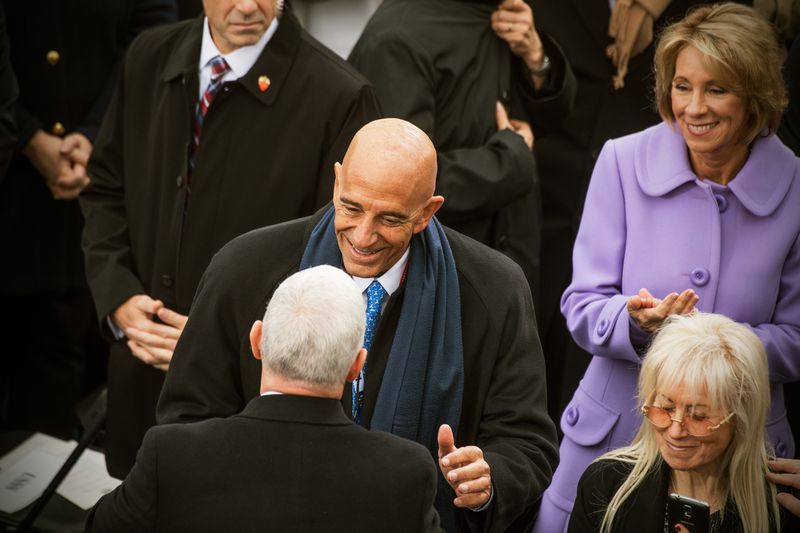 Tom Williams/CQ Roll Call via Getty Images
Tom Williams/CQ Roll Call via Getty Images- And in June another ABC News report stated that Mueller’s investigators wanted to know why several billionaires with “deep ties to Russia” got access to “exclusive, invitation-only receptions” during the inauguration.
Despite all that, the exact reason why Mueller has become so focused on the inauguration remains elusive, and he hasn’t shed light on it publicly. There are several possibilities, though.
- Illegal foreign donations: It is against the law for foreign nationals to donate to a presidential inaugural committee. No such donations to Trump’s inauguration are currently known. But CNN reported that Mueller is exploring whether wealthy Russians used “straw donors” with American citizenship to steer money into the inauguration.
- Rick Gates’s cooperation: Intriguingly, the recent stories on Mueller’s interest in the inauguration were published after Gates, the inauguration “shadow chair,” struck a plea deal in which he’d cooperate with Mueller, on February 23. It hasn’t been confirmed that Gates is providing information about inauguration shadiness to Mueller, but the timeline certainly lines up.
- Gulf connections: Another somewhat mysterious focus of Mueller’s investigation in recent months has been links between the Trump team and the rulers of the United Arab Emirates and Saudi Arabia. George Nader, an adviser to the UAE’s crown prince, was stopped at Dulles airport, had his electronics seized by Mueller’s team, and has since given extensive testimony to Mueller’s grand jury. And one ABC report suggested that inaugural donations tied to the UAE, Saudi Arabia, and Qatar were all being scrutinized by Mueller too. (Those are the three countries where Tom Barrack’s business interests have been heavily focused.)
- Russian collusion with Trump’s team: Finally, there’s the big question looming over all this: did Trump’s allies, in fact, collude with the Russian government to interfere with the 2016 election? The inauguration of course happened after the election was over, but could be important in understanding Russia’s ties to the Trump team and how their relationship progressed once he won. It also happened shortly after several curious contacts between Trump associates and Russians — Ambassador Sergey Kislyak and banker Sergey Gorkov’s visits to Trump Tower in December, Kislyak’s calls with Michael Flynn in late December, and Erik Prince’s Seychelles sitdown with a Russian fund manager (organized by George Nader) in mid-January, nine days before the inauguration.
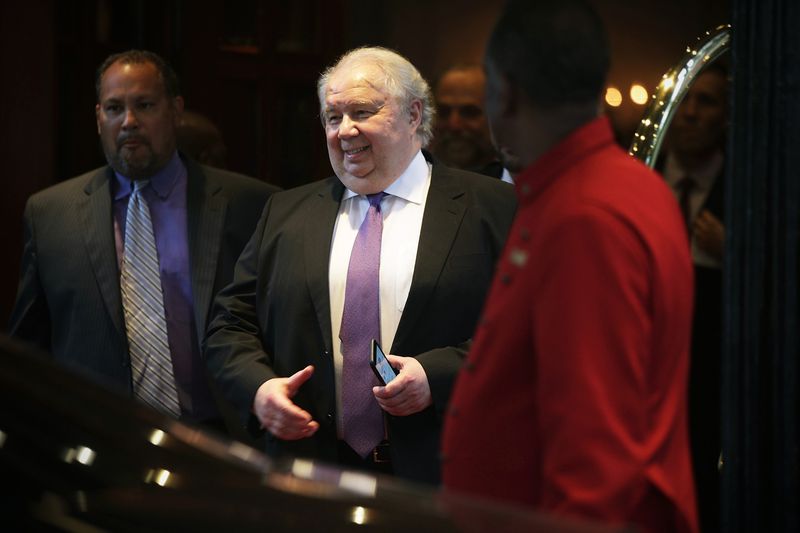 Alex Wong/Getty Images
Alex Wong/Getty ImagesWhat, if anything, all of this adds up to isn’t yet clear, but it’s clear enough that Mueller has had a lot to chew on here.
Certain Russia-tied donors and inaugural attendees have drawn particular scrutiny from Mueller
Sometime around March of this year, Russian oligarch Viktor Vekselberg flew in to a New York-area airport on a private plane — and was met there by Robert Mueller’s investigators, who questioned him and searched his electronic devices.
Vekselberg is the main owner and president of the Renova Group, a massive Russian conglomerate with aluminum and oil interests, and is one of the richest people in Russia. He didn’t directly give any money to Trump’s inauguration. But his cousin, Andrew Intrater, an American citizen who runs a US company tied to Vekselberg’s company, donated $250,000. Intrater had also kicked in $35,000 to the Trump Victory Committee during the campaign, despite having no previous history as a major political donor.
Vekselberg and Intrater attended Trump’s inauguration together, and at the January 19 candlelight dinner, they were seated with Trump’s lawyer, Michael Cohen, according to ABC News. Later that year, that company run by Intrater paid Cohen’s shell company, Essential Consultants LLC, $500,000 — for, they claimed, real estate advice.
Another hefty inaugural donation, of $1 million, came from Leonard Blavatnik, who runs a company called Access Industries. Blavatnik was on the guest list for the January 19 candlelight dinner too, as well as a more exclusive “chairman’s global dinner” with top Trump allies and foreign dignitaries, per ABC.
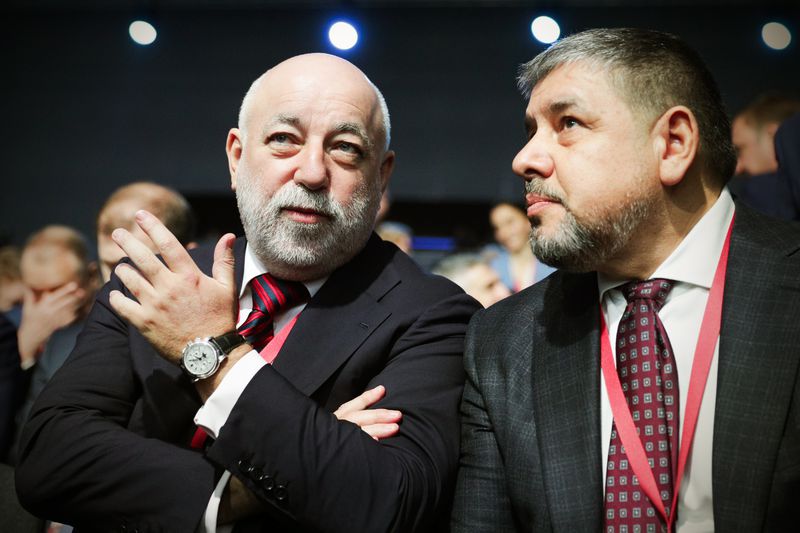 Vladimir SmirnovTASS via Getty Images
Vladimir SmirnovTASS via Getty ImagesBlavatnik is a Soviet-born, UK-based billionaire who is a US citizen. He also spent years partnered with Vekselberg in Russia’s aluminum industry, according to a 2014 New Yorker profile. Together, they built the second-largest aluminum company in Russia — and eventually became part of the largest, by merging with Oleg Deripaska’s Rusal. (Deripaska also appears to be a player in the collusion investigation — he employed Paul Manafort, and Manafort tried to get in touch with him during 2016.)
Other donations and guests, too, have raised eyebrows. Alexander Mashkevitch, a Kazakh mining billionaire, was on the guest list for the “candlelight dinner,” per ABC —and happens to have been in the Seychelles around the same time as Erik Prince, Erin Banco has reported for the Intercept.
And Natalia Veselnitskaya and Rinat Akhmetshin, who attended Don Jr’s infamous Trump Tower meeting, were in town too — they attended an inauguration night party thrown by Rep. Dana Rohrabacher (R-CA), who’s widely viewed as the biggest supporter of Putin’s regime in Congress.
No one mentioned here has been charged with any wrongdoing in Mueller’s probe. And it’s at least possible that many of the donations here are garden-variety influence peddling, rather than indicative of some larger and more sinister scheme. But if the Trump-Russia investigation is pursuing the time-tested strategy of following the money, this is clearly a good place to start.
What happened to the money?
Beyond the many questions about money collected by the inaugural committee, there have long been many questions about money going out of it.
In Ilya Marritz’s great piece on this topic for WNYC and ProPublica, she quoted people involved in previous inaugurations expressing puzzlement over how Trump’s team could have possibly spent over $100 million for what they got.
Unlike a campaign, the inaugural committee isn’t legally required to disclose very much about its spending. In its nonprofit tax form, the committee is required to break down its expenses in broad categories and to list its five biggest vendors. But it is not required to explain every line item.
In any case, according to the tax form, about half the money — over $50 million — went to just two vendors. $25.8 million went to WIS Media Partners, an event production firm started by a now-former adviser to Melania Trump. Another $25 million went to Hargrove Inc. for “event production.” What these firms did with those massive sums of cash is unknown.
That leaves about $50 million or so remaining. From that, about $10 million in total went to another three vendors, $4.6 million was paid out as salaries, and $5 million was left over and given out as grants. But where tens of millions more went remains a mystery, beyond the broadest of categories given on the disclosure forms.
For now, whether this was sloppy financial mismanagement or something shadier, is unclear. But if there is anyone who might know where much of the money went, it is Rick Gates. And whatever he knows, Robert Mueller now knows too.
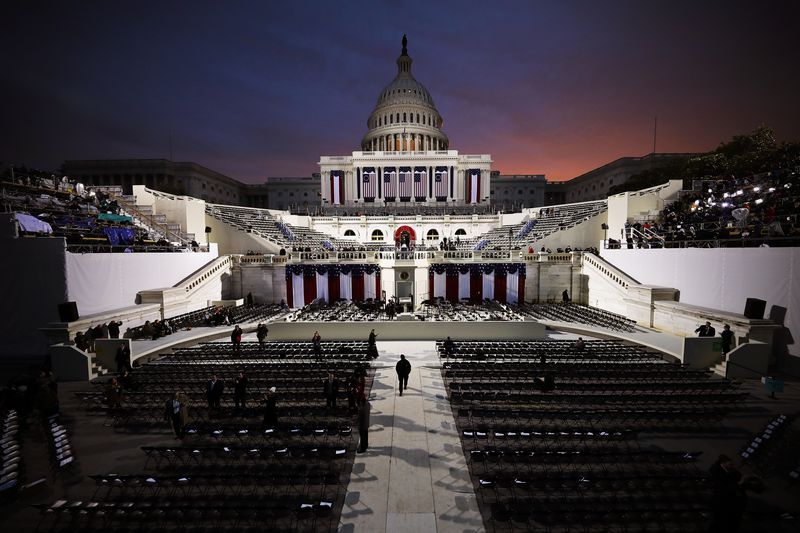 Andrew Gombert/AFP/Getty Images
Andrew Gombert/AFP/Getty Images
Read More
https://cdn.vox-cdn.com/community_logos/52517/voxv.png


